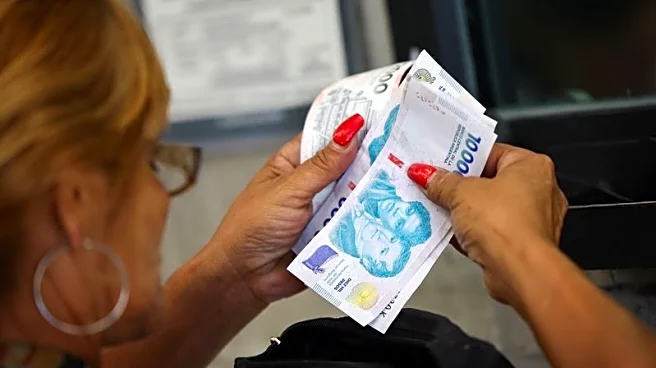BUENOS AIRES (Reuters) -Persistent exchange rate pressures continued to weigh on Argentina's financial markets on Wednesday, straining the Treasury as proceeds from a special liquidation deal with agricultural exporters dwindle.
Traders estimate the Treasury, under the Ministry of Economy, has sold more than $1.6 billion in the past six trading sessions to support the weakening peso. The ministry does not publicly report its market operations.
"This figure becomes even more significant considering
that there are still many trading sessions until the (midterm) elections this month," said Wise Capital.
"In just four trading days, following the near-complete withdrawal of agricultural exporters, the Treasury has already lost $1.35 billion—over 60% of the $2.23 billion raised under the zero-withholding tax scheme," it added.
Midterm elections on October. 26 are seen as a key test for President Javier Milei, who is navigating the second half of his term with limited congressional support.
In a bid to calm markets and ease pressure on the peso, Economy Minister Luis Caputo is in the United States outlining U.S. support that could include a $20 billion currency swap deal.
International dollar bonds were also falling as traders awaited details of the U.S. support.
"After the elections, it's likely a new framework will be introduced with a freer exchange rate and lower real interest rates, supporting reserve accumulation and more sustainable Treasury debt rollovers," said Roberto Geretto, an economist at AdCap.
The wholesale peso opened steady at 1,430 per dollar, supported by block currency sales aimed at capping volatility. The peso is hovering near the upper limit of its floating band, a breach of which would require the central bank (BCRA) to intervene by selling foreign reserves.
"Traders are closely watching Treasury operations and estimating how much room is left before the BCRA must step in again around the 1,480 peso mark," said economist Gustavo Ber.
"With markets awaiting updates from Washington, consensus is building that current policies are designed to hold the line until the vote, after which a more flexible exchange rate regime may emerge, depending on the outcome and potential U.S. financial support," Ber added.
In the asset market, selling persisted amid continued portfolio adjustments, traders said.
The S&P Merval stock index edged lower, while sovereign bonds fell around 0.5% in early trading.
(Reporting by Walter Bianchi, Additional Reporting by Rodrigo CamposEditing by Marguerita Choy)
















